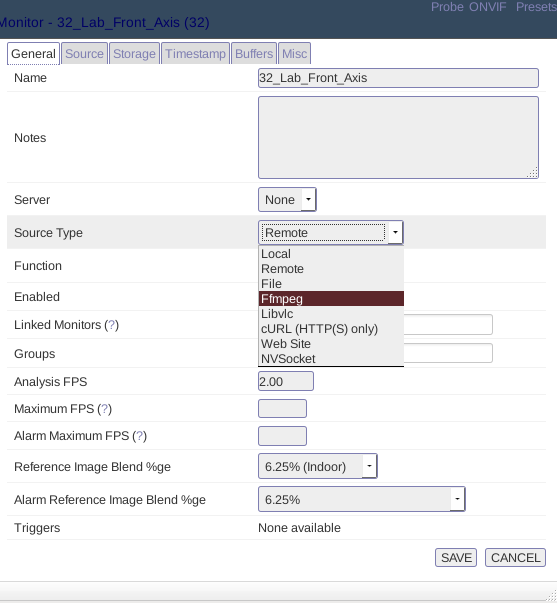Ubuntu/Debian For Zoneminder 1.30.4 & Debian Stretch it was necessary to install vlc-plugin-base. apt-get install vlc-plugin-base For Zoneminder 1.32 and newer, it is a dependency so should be included by default.
 Original file (557 × 603 pixels, file size: 42 KB, MIME type: image/png)
Original file (557 × 603 pixels, file size: 42 KB, MIME type: image/png)
File history Click on a date/time to view the file as it appeared at that time. Date/Time Thumbnail Dimensions User Comment current 03:50, 11 February 2021 Thumbnail for version as of 03:50, 11 February 2021 557 × 603 (42 KB) Snake (talk | contribs) You cannot overwrite this file.
File usage The following page uses this file: How to setup LibVLC on a camera
Metadata This file contains additional information, probably added from the digital camera or scanner used to create or digitize it. If the file has been modified from its original state, some details may not fully reflect the modified file. Horizontal resolution 39.37 dpc Vertical resolution 47.24 dpc File change date and time 07:40, 11 February 2021 PNG file comment Created with GIMP
NAME vlc, qvlc, svlc, nvlc, rvlc, cvlc - the VLC media player
SYNOPSIS vlc [OPTIONS] [ITEMS]...
DESCRIPTION This manual page documents briefly the VLC multimedia player and server.
OPTIONS VLC follows the usual GNU command line syntax, with long options starting with two dashes (`-'). For a precise description of options, please use "vlc --help". The complete list of VLC options depends on what plugins are installed because they automatically add their own options. Please use "vlc --longhelp --advanced" for a complete list of available options.
ITEMS VLC recognizes several URL-style items: *.mpg, *.vob, *.avi, *.mp3, *.ogg, *.opus Various multimedia file formats dvd://[<device>][@<raw device>][#[<title>][:[<chapter>][:<angle>]]] DVD device (for instance dvd:///dev/dvd). The raw device is op‐tional and must have been prepared beforehand. vcd://[<device>][@{E|P|E|T|S}[<number>]] VCD device (for instance vcd:///dev/cdrom). udp://[@[<multicast address>][:<local port>]] UDP stream, such as one sent by VLS or another VLC. Usually "udp://" is enough. http://<server address>[:<server port>]/[<file>] HTTP stream rtsp://<server address>[:<server port>]/<stream name> RTSP Video On Demand stream RTSP Video On Demand stream vlc://<command> Execute a playlist command. Commands are: pause (pause execution of other items), and quit (close VLC).
ENVIRONMENT VARIABLES The following environment variables may affect VLC: DISPLAY The X11 display server address. http_proxy The HTTP proxy server URL. OSSAUDIO_DEV The default audio output device, used by the OSSv4 output plugin. VLC_DATA_PATH The directory containing VLC run-time data files (e.g. /usr/share/vlc). VLC_PLUGIN_PATH An extra directory to load VLC plugins from. VLC_VERBOSE The level of verbosity for log messages (0: silent, 1: er‐ ror/info, 2: warning, 3: debug). XDG_CACHE_DIR XDG_CONFIG_DIR XDG_DATA_DIR The directories to store user cached data, user configuration files and user data files respectively. XDG_DOCUMENTS_DIR XDG_DOWNLOAD_DIR XDG_MUSIC_DIR XDG_PICTURES_DIR XDG_VIDEO_DIR The directories to fetch or store user text files, downloads, music, pictures (i.e. snapshots), and video respectively. XDG_SESSION_COOKIE The unique identifier of the desktop session, used by the PulseAudio output plugin.
SEE ALSO Online documentation: http://www.videolan.org/doc/
AUTHOR This manual page was written by Sam Hocevar